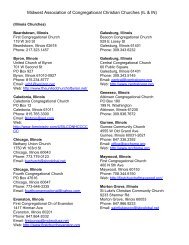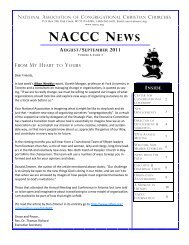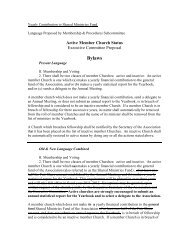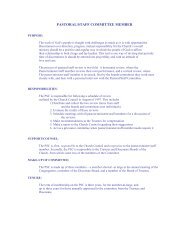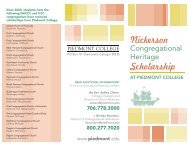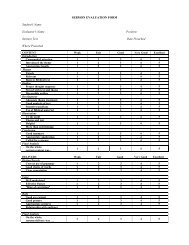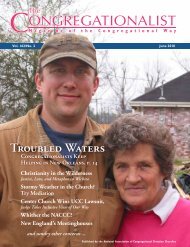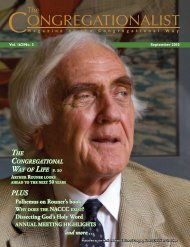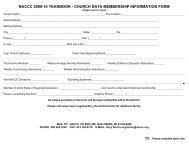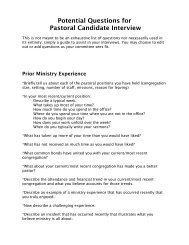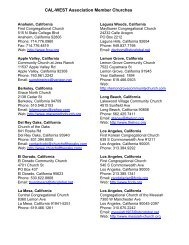8473 South Howell Avenue Oak Creek, WI 53154-0288 - National ...
8473 South Howell Avenue Oak Creek, WI 53154-0288 - National ...
8473 South Howell Avenue Oak Creek, WI 53154-0288 - National ...
Create successful ePaper yourself
Turn your PDF publications into a flip-book with our unique Google optimized e-Paper software.
Book Review<br />
Comet, Errand, Ocean, Compact<br />
A tome for sure, but worth its weight in beaver pelts by Randy Asendorf<br />
Review of Making Haste from Babylon:<br />
The Mayflower Pilgrims and Their World<br />
by Nick Bunker<br />
Alfred A. Knopf, 423 pages, $30.00<br />
In Making Haste from Babylon: The Mayflower Pilgrims and<br />
their World, Nick Bunker, an Englishman with a background<br />
in journalism and finance, looks at previously ignored evidence<br />
to provide a fresh interpretation of the old story.<br />
With meticulous research skills and a keen understanding of<br />
both British and New England geography, Bunker questions<br />
accepted truths while confirming others. Who knew that<br />
economic and political forces on both sides of the Atlantic—<br />
involving beaver pelts, Native American tribes, class differences,<br />
and the rise of modern journalism—combined in 1628<br />
to guarantee Plymouth Colony’s success? That the geography<br />
of Maine was at least as important as that of Massachusetts?<br />
Or that a comet seen in England in 1618 helped prompt the<br />
Mayflower’s voyage to America in 1620?<br />
Though religion was the main reason for emigration to<br />
the New World, clearly it was not the only one. The anger<br />
of Puritans at Anglican-style popery (the “Babylon” of the<br />
book’s title) is well-chronicled. Yet it’s impossible, says the<br />
author, to separate the Puritans’ urge for religious liberty from<br />
politics and economics. Here was a chance to succeed free<br />
from England’s bounds of class as well as from her strictures<br />
upon faith. Also, life expectancy was greater away from filthy,<br />
plague-infested England and Holland.<br />
Nick Bunker explains that while “Calvinistic zeal was far more<br />
important than other factors in bringing about the creation of<br />
New England,” Bradford, Winslow, and the other Pilgrim Fathers<br />
sometimes omitted from their narratives facts that may have<br />
told us much more about this watershed in Western civilization.<br />
I might quibble with Bunker’s assertion that Puritanism was<br />
for many merely a way to achieve a rank they could otherwise not<br />
attain. Was reaching a “gentleman’s” status so important that men<br />
would risk their lives for it? At any rate, the work ethic that the<br />
Puritans fostered has served America well for almost 400 years.<br />
The Pilgrims also gave us another pillar of the American<br />
Way: The Mayflower Compact. Bunker gives them full credit<br />
here. Some historians have dismissed the Compact as a short,<br />
temporary measure, later supplanted by royal decree—surely<br />
not “the foundation stone of American democracy.” But after<br />
carefully examining other documents of the time, Bunker concludes<br />
that Englishmen on both sides of the Atlantic viewed it<br />
as a fundamental and permanent source of authority, even after<br />
the colony received a new charter from England. This is because<br />
it depended on the vote of the governed, whereas a patent<br />
merely came from the King. The 41 signatures represented 90<br />
percent of the men on the Mayflower, a super-majority. William<br />
Brewster, the probable author, didn’t insist on a religious creed<br />
or even any statement of faith at all by the signers. Our spiritual<br />
ancestors clearly established freedom of conscience and separation<br />
of church and state from the start.<br />
Making Haste from Babylon is a hugely important book for<br />
people of our tradition, but it’s not light reading. In fact, it’s a<br />
tome. Read it anyway for new insights about who we are, where<br />
we came from, and where we may be going.<br />
rA n D y As E n D o r f is a retired teacher and a<br />
student of Congregational history and has served<br />
the NACCC in various roles, currently as a<br />
member of the Executive Committee. He and his<br />
wife, Nancy, are members of the Congregational<br />
Church of Sun City, Ariz., and co-chair the host<br />
committee for the 2011 Annual Meeting and<br />
Conference in Scottsdale.<br />
5



